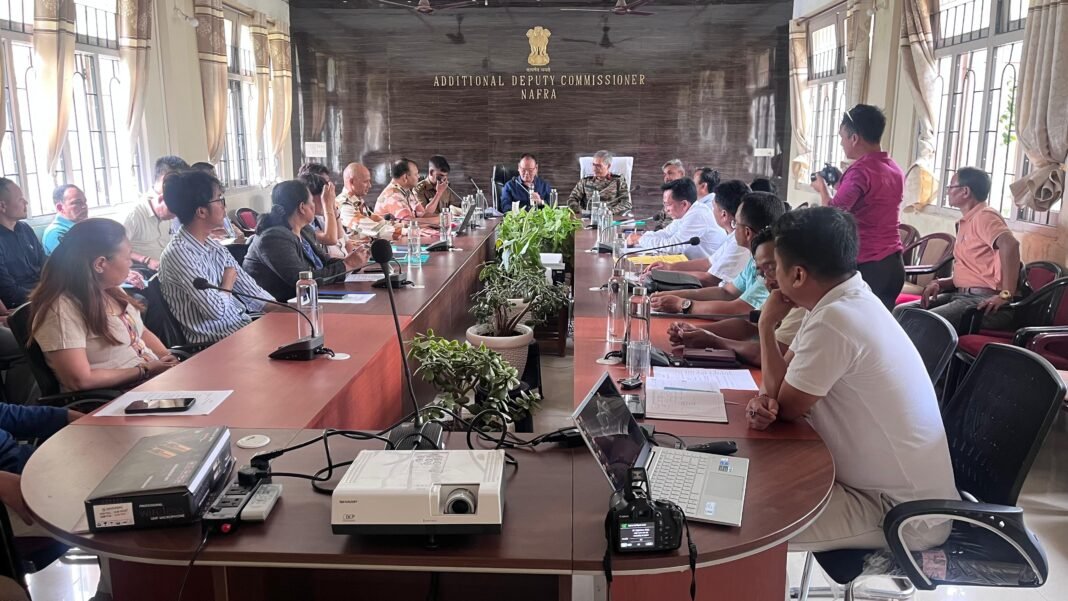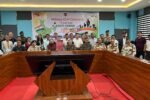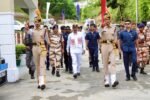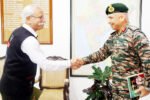HT Correspondent
TEZPUR, June 23: In a significant move to enhance collaboration between the armed forces and civil administration, a Military-Civil Fusion Workshop was conducted at Nafra, the headquarters of Bichom District in Arunachal Pradesh.
Organised under the leadership of the Indian Army’s Blazing Sword Division, the workshop brought together a wide range of stakeholders—including senior Army officers, the Deputy Commissioner, Superintendent of Police, representatives of civil departments, personnel from the Indo-Tibetan Border Police (ITBP), and tribal leaders—to explore avenues for deeper synergy in ensuring both development and security in the strategically important frontier region.
The workshop aimed to serve as a high-level platform for promoting mutual trust, cooperation, and a sense of shared responsibility among military and civil stakeholders working in the remote and often challenging terrains of Arunachal Pradesh.
Addressing the gathering, the presiding Brigadier described the initiative as a cornerstone of the Army’s vision to partner with the local administration and communities in furthering peace and progress in border areas.
He noted that proactive collaboration between uniformed personnel and civil institutions is key to fostering stability and inclusive growth in the sensitive border belt.
Deputy Commissioner Bopai echoed the sentiment, reaffirming the civil administration’s unwavering commitment to coordinate with the defence forces in all spheres of public interest.
“Development and national security are two sides of the same coin,” Bopai remarked, adding that the administration is keen to ensure that welfare and infrastructure development in the region proceed in tandem with the robust security efforts of the armed forces.
The Superintendent of Police present at the event highlighted critical areas of concern, particularly the need to engage youth through skill development and awareness campaigns to prevent drug abuse and antisocial activities.
He underlined that law enforcement and developmental strategies must work in tandem to empower the younger generation and discourage them from falling into the trap of narcotics and delinquency.
A significant portion of the workshop was dedicated to showcasing various community welfare initiatives undertaken by the Indian Army under ‘Operation Sadbhavna’.
These included National Integration Tours for school students, free medical and eye-care camps, distribution of computers in remote schools, and logistical assistance for the establishment of a Vocational Training Centre in Bana aimed at strengthening local Self-Help Groups (SHGs).
These programmes, the Army noted, are designed to bridge gaps between the local populace and the military, ensuring that the dividends of peace and security are tangibly felt on the ground.
The Army’s participation in important community celebrations such as the Ching Dang festival, as well as national holidays like Independence Day and Republic Day, was praised for fostering a spirit of inclusivity and national pride among local communities.
Officials acknowledged that such shared cultural engagements have been instrumental in building bonds of goodwill and respect between the military and local populations.
The workshop also threw light on Army-backed infrastructure projects that have directly benefitted the region’s residents.
These include the construction of a Transit Facility, a Community Hall, and an Overhead Water Tank, which have significantly improved civic amenities in and around Nafra.
Participants welcomed the discussion of new proposals, including the promotion of adventure sports and the development of a Rafting Node at Nafra.
These initiatives are expected to not only boost tourism in the area but also provide recreational opportunities and economic prospects for the local youth.
By the end of the workshop, a strong consensus emerged among all stakeholders to continue deepening civil-military cooperation to ensure Arunachal Pradesh’s border districts grow stronger, safer, and more connected.
The initiative was widely appreciated by those in attendance and hailed as a timely intervention in fostering a unified approach to regional development and national security.












